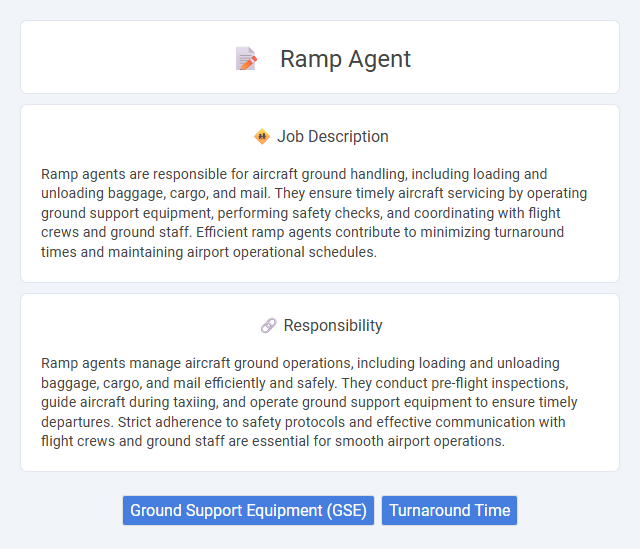
Ramp agents are responsible for aircraft ground handling, including loading and unloading baggage, cargo, and mail. They ensure timely aircraft servicing by operating ground support equipment, performing safety checks, and coordinating with flight crews and ground staff. Efficient ramp agents contribute to minimizing turnaround times and maintaining airport operational schedules.
Working as a ramp agent is likely suitable for individuals who enjoy physical activity and can handle demanding, outdoor work environments, including all weather conditions. People with strong multitasking skills, attention to detail, and the ability to work under tight schedules may find this job a good fit. Those with physical limitations or difficulty working in fast-paced, high-pressure settings might face challenges in this role.
Qualification
Ramp agents require a high school diploma or equivalent, with prior experience in airport ground handling preferred. Physical fitness is essential due to the demanding nature of loading, unloading, and equipment operation tasks. Strong communication skills and the ability to follow safety protocols are critical for coordinating airport ramp activities efficiently.
Responsibility
Ramp agents manage aircraft ground operations, including loading and unloading baggage, cargo, and mail efficiently and safely. They conduct pre-flight inspections, guide aircraft during taxiing, and operate ground support equipment to ensure timely departures. Strict adherence to safety protocols and effective communication with flight crews and ground staff are essential for smooth airport operations.
Benefit
Ramp agent jobs likely offer competitive hourly wages and potential for overtime pay, making them financially attractive for many candidates. Benefits may include health insurance, retirement plans, and paid time off, contributing to overall job satisfaction. Opportunities for career advancement within the airline industry might also be a significant advantage for those seeking long-term employment.
Challenge
Working as a ramp agent likely involves managing unpredictable weather and tight schedules, presenting constant challenges in maintaining aircraft turnaround efficiency. The probability of encountering physical demands and safety hazards throughout the day increases the need for vigilance and adaptability. Successfully navigating these challenges can significantly enhance operational flow and team coordination on the tarmac.
Career Advancement
Ramp agent positions offer a critical foundation for career advancement within the aviation industry, providing hands-on experience with aircraft ground operations, baggage handling, and safety protocols. Mastery in these areas enables ramp agents to progress into supervisory roles, operations management, or specialized technical positions such as aircraft maintenance support. Employers value ramp agents who demonstrate reliability, teamwork, and attention to detail, which are essential skills for leadership and higher-responsibility roles.
Key Terms
Ground Support Equipment (GSE)
Ramp agents are responsible for the efficient handling and operation of Ground Support Equipment (GSE), including baggage carts, belt loaders, and aircraft tugs, ensuring timely aircraft servicing and turnaround. Proficiency in maneuvering and maintaining GSE directly impacts flight safety and on-time departures in busy airport environments. Mastery of GSE operations supports seamless loading, unloading, and refueling processes integral to ground handling logistics.
Turnaround Time
Ramp agents play a critical role in minimizing turnaround time by efficiently handling aircraft loading, unloading, and ground support operations. Their responsibilities include coordinating baggage transfer, operating ground equipment, and ensuring timely aircraft servicing to meet tight schedules. Streamlined ramp agent performance directly impacts airline on-time departures and improves overall operational efficiency.
 kuljobs.com
kuljobs.com